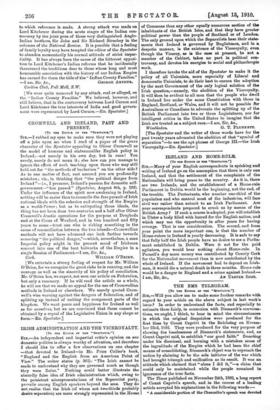CROMWELL AND IRELAND, PAST AND PRESENT.
[TO THR EDITOR OF TIM "SPNCTIT01.:]
SIR,—I rubbed my eyes to make sure they were not playing off a joke upon me when I read of a paper of the grave character of the Spectator appealing to Oliver Cromwell as the model of humane and statesmanlike English policy in Ireland,—not merely in his own day, but in ours ! You surely, surely do not mean it ; else how can you manage to ignore the effect of such teaching upon those who may still hold out for "the methods of barbarism" on the other side ? As to one matter of fact, rest assured you are profoundly mistaken ; viz., in thinking that "the political danger from Ireland "—i.e., I presume, Ireland's passion for domestic self- government—" has passed" (Spectator, August 6th, p. 193). Under the inquence of the spirit now awakening in Ireland, nothing will be easier than to reconcile the free pursuit of Irish national ideals with the cohesion and strength of the Empire as a world-rower; but as to extirpating those ideals, the thing has not been done two centuries and a half after Oliver Crernwell's drastic operations for the purpose at Drogheda and at the Cross of Wexford, and in two hundred and fifty years to come—trust one who is risking something in the cause of reconciliation between the two islands—Cromwellian methods will not have advanced one inch further towards removing "the political danger,"—which, nevertheless, a sane Imperial policy might in the present mood of Irishmen convert into one of the best bulwarks of the Empire in a single Session of Parliament. —I am, Sir, &c., [We entertain a strong feeling of respect for Mr. William O'Brien, for we recognise the great risks he is running, and the courage as well as the sincerity of his policy of conciliation. Mr. O'Brien has, we expect, not seen our article on Federation, but only a summary. If he will read the article as a whole, be will see that we made no appeal for the use of Cromwellian methods in Ireland or elsewhere. We merely quoted Crom- well's wise warning against the dangers of federation, and of splitting up instead of uniting the component parts of the kingdom. We want peace and happiness for Ireland as well as for ourselves, but we are convinced that these cannot be obtained by a repeal of the Legislative Union in any shape or form.—En. Spectator.]






































 Previous page
Previous page